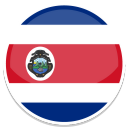
 Costa Rica eSIM & VPN by FlowVPN
Costa Rica eSIM & VPN by FlowVPN
Flow VPN offers unlimited Costa Rica VPN services and offers eSIM data packages for Costa Rica and 59 other countries.
Last Updated: 2025-06-30 15:30:51 CST
Get Unlimited VPN & 1GB eSIM for Costa Rica & 59 other countries for just $15
Heading to Costa Rica? Holidaying in San Jose?
Get online with a Global eSIM from FlowVPN in Costa Rica, or connect to our unlimited Costa Rica VPN servers.
FlowVPN has VPN servers in 70+ countries, and offers a 4G enabled Global eSIM for your phone or tablet that can be used in Costa Rica.
Signup now and get VPN access from $ 1.99 per month, or VPN & eSIM services from just $ 15.
Get connected to VPN servers in Costa Rica
VPN Services are available to access from Costa Rica, and FlowVPN has infrastructure in this region giving you fast, unlimited access to the Internet. Our VPN servers are in a data centre close to San Jose.
Access Costa Rica VPN Servers with FlowVPN now
As well as servers in Costa Rica, FlowVPN has 100s of servers located in 70+ countries giving you the freedom of fast, unlimited VPN.
Get VPN IPs in Costa Rica
FlowVPN has multiple servers in Costa Rica giving you access to local IPs. Get unlimited VPN access to Costa Rica through FlowVPN’s global network.
Get connected to Costa Rica VPN servers for just $1.99!
Sign-up to FlowVPN with VPN Promotion / Coupon Code COUNTRY-COSTA RICA for just $1.99 for your first month – almost half the normal price!
Costa Rica VPN Services
Flow VPN provides VPN services from our host near San Jose, Costa Rica. The servers near San Jose is part of our high speed global network spanning 100+ locations in more than 60 countries. We provide unlimited Costa Rica VPN services with a free trial, protecting your data allowing you to access the Internet privately and securely. We do not artificially cap your bandwidth.
We have multiple servers in Costa Rica providing a fast and reliable connection.
Our VPN Servers close to San Jose (Costa Rica) support standard VPN protocols including WireGuard, PPTP, L2TP, IPSec, IKEv2, OpenVPN and SSH VPN. We have clients available for iPhone, macOS, Windows and Android – download the FlowVPN app from your App Store or sign-up now.
How fast are Internet connections in Costa Rica?
The speed of Internet connections in Costa Rica can vary significantly based on location, service provider, and type of service plan. Here is a general overview:
- Urban Areas: In cities like San José, broadband speeds are typically much faster. It is common to find speeds ranging from 10 Mbps to 100 Mbps or more for both residential and business users.
- Rural Areas: Internet speeds in rural areas can be considerably slower. Speeds may range from 1 Mbps to 10 Mbps, though this can vary depending on the availability of infrastructure.
- Service Providers: Major service providers like ICE, Cabletica, and Claro offer various plans with differing speeds. High-speed fiber optic connections are also increasingly available in select areas.
Overall, while Internet speeds in Costa Rica are improving, they can still be inconsistent depending on the region and specific circumstances.
Is the Internet censored in Costa Rica?
No, the Internet is not heavily censored in Costa Rica. The country is known for having a high level of freedom of speech and freedom of the press.
- Legal Framework: Costa Rica’s constitution protects freedom of expression and access to information.
- Internet Access: The government generally does not interfere with access to online content.
- Content Restrictions: There are very minimal content restrictions; mainly, illegal activities and explicit content may be subject to monitoring and restrictions.
However, like in any country, monitoring and regulations may exist to a certain extent for national security and legal reasons, but these are not considered to be oppressive or overly restrictive.
Is pornography restricted in Costa Rica?
Yes, pornography is restricted in Costa Rica. The country has laws and regulations that govern the production, distribution, and consumption of pornographic content. Here are some key points:
- It is illegal to distribute pornographic material to minors.
- There are restrictions on the public display of pornographic content.
- Regulations exist to control internet access to pornographic websites, especially in public institutions like schools and libraries.
- Law enforcement monitors and enforces these regulations to ensure compliance.
Overall, while access to pornography is not entirely prohibited, it is subject to various legal constraints to protect specific groups and maintain public decency standards.
What is the current internet penetration rate in the Costa Rica?
As of the most recent data, the internet penetration rate in Costa Rica is approximately 86% of the population. This rate reflects the percentage of individuals who have access to the internet within the country.
For more details, consider the following points:
- Continued investments in digital infrastructure are expected to increase this rate.
- Government initiatives focus on improving accessibility, particularly in rural areas.
- Efforts to enhance digital literacy are ongoing to ensure more people can effectively use the internet.
How concerned are people in Costa Rica about data privacy?
People in Costa Rica are increasingly concerned about data privacy due to various reasons such as:
- Growing Digital Economy: With more services and transactions moving online, the need for secure data handling has become critical.
- Data Breaches: Incidents of data breaches have raised awareness about the importance of safeguarding personal information.
- Legislative Changes: Recent updates to data protection laws have made people more conscious about their rights and the responsibilities of organizations handling their data.
- International Influence: Global trends and news about data privacy issues in other countries also influence the level of concern locally.
Overall, while there is a growing concern, the level of awareness and action varies across different demographics and sectors.
What are the cybersecurity challenges faced by internet users in Costa Rica?
Internet users in Costa Rica face several cybersecurity challenges, including but not limited to:
- Phishing Attacks: Scammers use deceptive emails or websites to steal personal information.
- Ransomware: Malicious software encrypts data and demands a ransom for its release.
- Data Breaches: Unauthorized access to personal and sensitive information stored in databases.
- Identity Theft: Cybercriminals steal and misuse personal information to commit fraud.
- Weak Passwords: Many users do not follow strong password practices, making accounts easier to compromise.
- Device Vulnerability: Insufficiently secured devices are susceptible to malware and other attacks.
- IoT Security: Increasing use of Internet of Things (IoT) devices that may lack strong security measures.
- Lack of Awareness: Limited awareness and understanding of cybersecurity threats and best practices.
These challenges necessitate improved cybersecurity education, stronger authentication methods, and proactive security measures to protect users in Costa Rica.
What are the most visited websites in Costa Rica?
Most Visited Websites in Costa Rica
Here are some of the most popular websites in Costa Rica:
- Facebook – A widely used social media platform for connecting with friends and family.
- YouTube – A popular video-sharing website where users watch and upload videos.
- Google – The leading search engine used for obtaining information on the internet.
- Instagram – A social media app for sharing photos and videos.
- Netflix – A streaming service offering a variety of TV shows, movies, and documentaries.
These websites see a high amount of traffic due to their utility, entertainment value, and social connectivity.
What are the most popular social media platforms in the Costa Rica?
The most popular social media platforms in Costa Rica typically include:
- YouTube
- TikTok
These platforms are widely used for communication, entertainment, and business purposes.
Costa Rica VPN Server Status
The Costa Rica VPN Server operated by FlowVPN was last automatically tested at: 2025-06-30 15:30:51 CST
This test checks the server uptime and availability, as well as verifying all services are operating as expected.
Our servers are constantly monitored to ensure there are no issues. We use internal monitoring tools as well as multiple third party providers to ensure all services are regularly checked and benchmarked so we can identify any potential issues.
VPN Latency – Ping Speed Test
We perform ping tests from our VPN server in Costa Rica to servers around the world. We have multiple servers in almost all locations but the results published below are the most recent test results. We may have faster optimised routes from your location based upon your IP route when connecting.
| Costa Rica VPN Ping to Destination Server | Latency (ms) |
|---|---|
| Argentina | 187.403 |
| Armenia | 234.909 |
| Australia 1 | 269.029 |
| Australia 3 | 281.945 |
| Azerbaijan 2 | 221.516 |
| Azerbaijan | 243.233 |
| Bahrain | 231.912 |
| Bahrain (UK) | 236.324 |
| Bahrain (USA) | 231.615 |
| Belgium | 165.583 |
| Bolivia | 158.562 |
| Bosnia | 198.327 |
| Brazil | 172.372 |
| Canada (C) | 98.796 |
| Canada (E) | 93.158 |
| Canada (W) | 128.512 |
| Chile | 166.689 |
| Croatia | 203.287 |
| Czech Republic 2 | 183.872 |
| Denmark | 163.925 |
| Ecuador | 102.222 |
| Estonia 2 | 196.262 |
| Finland 2 | 175.402 |
| France | 161.256 |
| Germany 1 | 163.362 |
| Germany 3 | 173.148 |
| Guatemala | 89.938 |
| Hong Kong 1 | 289.001 |
| Hong Kong 6 | 307.709 |
| Hong Kong 7 | 281.281 |
| Hungary | 185.335 |
| Indonesia | 315.326 |
| Ireland | 182.630 |
| Italy 2 | 177.690 |
| Kazakhstan 2 | 265.606 |
| Latvia 2 | 192.767 |
| Latvia | 195.417 |
| Liechtenstein | 196.468 |
| Lithuania 1 | 200.502 |
| Lithuania 2 | 283.314 |
| Macedonia | 206.992 |
| Malaysia 1 | 296.700 |
| Mexico | 107.284 |
| Moldova | 206.163 |
| Netherlands | 176.609 |
| New Zealand | 266.760 |
| Nicaragua | 44.935 |
| Norway | 184.684 |
| Panama | 57.317 |
| Peru | 122.192 |
| Philippines | 301.251 |
| Poland 3 | 202.079 |
| Portugal | 198.647 |
| Puerto Rico | 90.398 |
| Romania | 195.000 |
| Serbia | 194.744 |
| Slovakia | 196.793 |
| South Africa | 315.872 |
| South Korea 2 | 251.159 |
| Spain 1 | 185.345 |
| Spain 2 | 166.888 |
| Sweden 1 | 164.096 |
| Sweden XIP | 164.270 |
| Switzerland | 178.914 |
| Taiwan 3 | 292.306 |
| Taiwan 4 | 250.333 |
| Taiwan 5 | 323.833 |
| Ukraine | 213.128 |
| United States Central | 122.172 |
| United States Hawaii | 169.661 |
| United States LA | 137.065 |
| USA via Singapore | 274.634 |
| USA via Taiwan | 285.466 |
Costa Rica Facts
Costa Rica Top Level Domain: .cr
Currency: Colon
